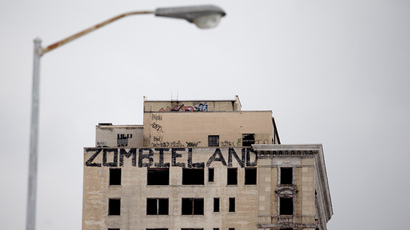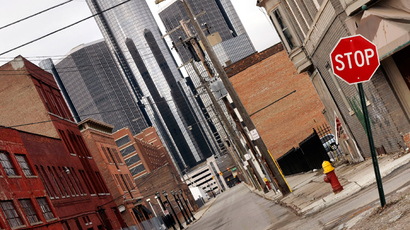Detroit police adopt ‘stop-and-frisk’

The controversial “stop-and-frisk” tactic used by the New York Police Department could be coming to the Motor City: law enforcement agents in Detroit, Michigan plan to adopt a policing method from officers in the Big Apple.
The Detroit News reported on Monday that traffic cops in the once-booming Rust Belt city are currently being trained to learn their city’s version of what has become a hot topic of contention in New York.
According to some Detroit cops, officers in Motown have already been using practices similar to the stop-and-frisk tactics deployed in NYC for years. Now, however, Traffic Unit officers are being sent through aggressive training in hopes that new tactics will “prevent street crime through the use of traffic stops.”
The Detroit Police Department has signed a contract with consultants at the Manhattan Institute and Bratton Group, the paper reported, in order to develop a more stringent strategy for cutting down on criminal activity.
“The DPD Traffic Unit (will) evolve its mission from principally the issuance of tickets toward the prevention of crime,” the contract reads.
News of new tactics being used in Detroit comes days after a federal judge in New York said that the NYPD exhibited racial bias in conducting its stop-and-frisk pat-downs. US District Judge Shira Scheindlin said the policy unfairly targets minorities, and ordered for reform and an independent monitor to oversee the NYPD’s use of the tactic. City officials, including Mayor Michael Bloomberg, decried the decision and filed an appeal on Friday.
Despite that ruling though, Manhattan Institute fellow Heather MacDonald told the Detroit News that she doesn’t think the DPD will suffer any setbacks.
“(Scheindlin) has embraced a flawed statistical model for determining when officers are racially profiling that uses a population benchmark rather than a crime benchmark that guarantees if officers are patrolling high-crime neighborhoods, which are primarily minority communities, they’re going to be vulnerable to racial profiling lawsuits,” she said.
“There’s no way a police department can avoid generating racially disproportionate arrests, because the crime patterns are what they are,” MacDonald added.
In a statement released this week from DPD Assistant Chief Erik Ewing, the officer said, “Detroit's population is mostly African American, so it stands to reason that a high number of African Americans will be stopped, based on reasonable suspicion. This is not racial profiling, just officers doing good constitutional police work."
On Monday this week, Mayor Bloomberg touted stop-and-frisk during a press conference in which he unveiled the largest illegal gun bust in the history of the city. According to city officials, a court-authorized wiretap placed on one of the 19 individuals indicted in the gun running scheme revealed that participants were concerned with walking the streets of New York with contraband given the city’s use of stop-and-frisk.
“I think generally it’s believed by law enforcement people that without this tactic, the bad guys would feel a lot more comfortable in carrying guns,” Bloomberg said. “They carried guns before. They aren’t carrying guns now,” he added, “Common sense says that if you run a risk of getting stopped, you’re going to pay more attention to what’s in your pocket.”
Once a vibrant industrial town, Detroit has since fallen victim to a surge in poverty, crime and economic issues. Forbes listed it as the most dangerous city in America in 2012, and last month the city filed for federal bankruptcy protection.
The rate of violent crime per capita in Detroit for 2012 clocked in at more than five times the national average, Forbes reported.














